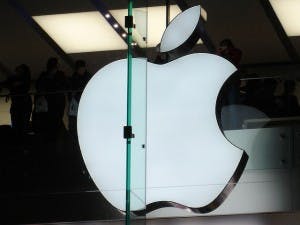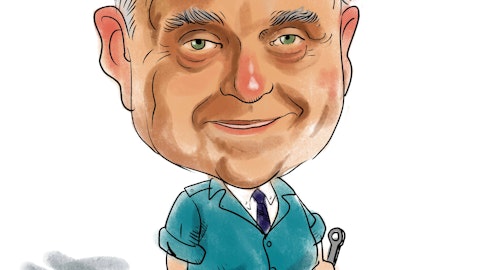
Innovation is one way of staying ahead, but buying rights to it can be quicker. Major tech companies know this and spend millions of dollars every year on patents they hope will give them a competitive advantage. Skip the research: Investors should take a look at which companies use this strategy well.
Apple Inc. (NASDAQ:AAPL) shows strength in patents
Patents have become essential to any technology company. It is surprising that one of the companies known for its innovation is actually a leader in purchasing patents. Apple Inc. (NASDAQ:AAPL) has been the biggest purchaser for the last two years and is now ranked ahead of industry giants Hitachi, Panasonic, Canon, and Sony.
That being said, Apple Inc. (NASDAQ:AAPL)’s play of the patent game can be seen in the number of its own patents, as well as the quality of these patents. In 2011, Apple was granted a total of 566 U.S. utility patents, a fivefold increase over the 110 U.S. utility patents it was granted in 2008. And this number does not include patents it acquired from elsewhere—for example, as part of the consortium that recently purchased the Nortel Networks patent portfolio.
What was billed as ‘the largest exchange of intellectual property rights in the Internet age’, Apple Inc. (NASDAQ:AAPL) and Microsoft Corporation (NASDAQ:MSFT) have agreed to buy from the bankrupt Nortel access to more than 6,000 patents covering key telecommunications technologies, from Internet services to wireless data networking. The consortium also included Sony, Research In Motion Ltd (NASDAQ:BBRY), Ericsson and EMC Corporation (NYSE:EMC).
Even after such rapid growth, Apple Inc. (NASDAQ:AAPL)’s patent portfolio is still dwarfed by those of others on the Electronics scorecard. Panasonic was granted 3132 U.S. utility patents in 2011, the most of any electronics company, followed by Hitachi (2924), Canon (2715), and Sony (2417). Clearly patents are where companies are looking. But Apple Inc. (NASDAQ:AAPL) is not buckling under the pressure. Apple recently filed two new patent applications that show a curved battery for future phone designs. Apple could be experimenting with a look for its iPhones or iPod Touch devices. Apple Inc. (NASDAQ:AAPL) is high on my list when looking through a patent lens. The quality of Apple’s current patents and future patents will be a pillar for growth.
Google Inc (NASDAQ:GOOG) closes in
Apple Inc. (NASDAQ:AAPL) is not alone among its competitors in attempting to develop a robust patent portfolio. Google Inc (NASDAQ:GOOG) has been acquiring patents from companies like International Business Machines Corp. (NYSE:IBM), has looked at acquiring patent-intensive InterDigital, and who could forget the heretofore unrewarding purchase of Motorola Mobility, which most assume was because of the company’s extensive patent portfolio. Google’s $12.4 billion purchase last year of mobile-phone pioneer Motorola Mobility Holdings partly for its trove of more than 17,000 patents is showing signs it wasn’t much of a bargain.
A judge recently ruled in favor of Microsoft Corporation (NASDAQ:MSFT) over the royalties claimed by Motorola for the use of its technology in Microsoft’s Xbox. According to Reuters, “Motorola had sought as much as $4 billion a year for use of its so-called standard, essential wireless and video patents, while Microsoft Corporation (NASDAQ:MSFT) argued its rival deserved about $1 million a year. Robart decided the appropriate payment was about $1.8 million.”
The patent race is not based solely on acquisitions. Like Apple, Google Inc (NASDAQ:GOOG) has dramatically increased its own patent production in recent years and is second to Yahoo! Inc. (NASDAQ:YHOO) on the 2010 Communication/Internet Services scorecard. In 2011, Google was granted 283 U.S. utility patents, compared to only 28 in 2008.
Recently, Apple Inc. (NASDAQ:AAPL) and Google Inc (NASDAQ:GOOG) have joined forces to bid on Eastman Kodak’s patent portfolio. The deal has been approved by a judge, according to Bloomberg. Eastman Kodak put its patents up for sale as part of a bankruptcy filing. According to reports, Apple and Google Inc (NASDAQ:GOOG) had formed their own consortium to acquire the patents and bid around $150 million to $250 million for them. However, Kodak, which had hoped to raise more than $2 billion from the sale, announced earlier this week that it was delaying the announcement of a winner. In a recent statement to CNET, the company added that it might not even sell the patents at all.
Microsoft fights back
However, Microsoft Corporation (NASDAQ:MSFT) in particular has been taking swipes at Google Inc (NASDAQ:GOOG) through targeting handset makers that use Android – it’s built on the Linux Kernel, which supposedly infringes multiple patents owned by Microsoft. As such, companies such as HTC – which uses Android on many of its handsets – must pay Microsoft Corporation (NASDAQ:MSFT) for each handset it sells with that operating system installed.
This is a key example of how patents can be used as leverage for competitive advantage. Microsoft Corporation (NASDAQ:MSFT) is hedging Google’s growth, forcing Google Inc (NASDAQ:GOOG) to work around the limitations either through patents of its own, or another line of application.
Companies with patents are not the only way investors can score in the patent game. Investors also have the option of buying companies that help other companies manage and monetize their patents. As technology booms, there will be no shortage of individuals and companies seeking IP rights to their own inventions. Thus, a company that seeks to provide this continuing and growing demand would be beneficial to look into. One of these companies, Marathon Patent Group (MARA), has developed strategies that allow its clients to maximize the value of IP assets through a wide range of services. Inventors and patent owners can monetize patent portfolios through IP licensing campaigns, idea creation, development, and enforcement. In other words, Marathon takes businesses and individuals from start to finish in the IP process.
Marathon goes in at ground level. Assisting in development and commercialization of a license, it creates a mutually beneficial relationship with all its clients. Moreover, these partnering opportunities create an ongoing relationship that includes patent analysis and watchful tracking of patent implementation.
Conclusion
Companies that assist others in the establishing and security of their patents will be key as growth through innovation (which is a hallmark of the technology sector) continues. The past decade has seen a patent renaissance and a robust, dynamic market has emerged. Patents are a vibrant part of today’s economy and IP should be an integral component of any company’s competitive advantage. Building a successful product may be the first step, but without a strong IP position, any success may be short-lived. Other indicators need to be assessed, however, patents can be a key to a sustainable position. From a patent standpoint, I see these companies as excellent opportunities for the investor.
Investors looking at growth in the patent space should consider Apple Inc. (NASDAQ:AAPL) for its high quality patents. Investors should also keep Google Inc (NASDAQ:GOOG) high on their list as it has been dramatically increasing its patent list. Investors looking at the patent space should keep Microsoft Corporation (NASDAQ:MSFT) on their radar, but I believe it is the worst pick in this group.
The article 3 Companies To Watch Closely In The Patent Race originally appeared on Fool.com.
Copyright © 1995 – 2013 The Motley Fool, LLC. All rights reserved. The Motley Fool has a disclosure policy.

